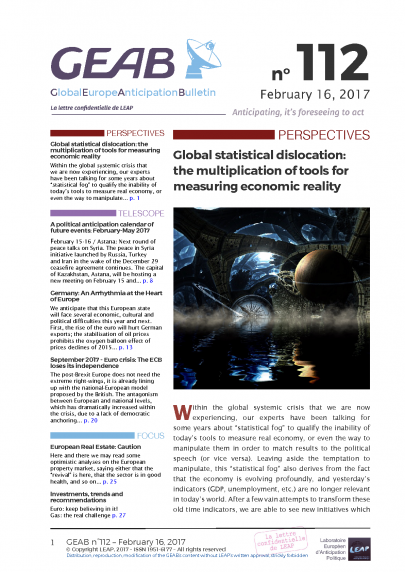GEAB 112
The post-Brexit Europe does not need the extreme right-wings, it is already lining up with the national-European model proposed by the British. The antagonism between European and national levels, which has dramatically increased within the crisis, due to a lack of democratic anchoring at the European level, has led in just 6 months to a complete takeover of the European institutions by the Member States. The problem is that the failure of the community method results a “might makes right” system: when it comes to economic and monetary matters, Germany, for whom it’s more than it can handle. We anticipate that the very independent ECB – the last bulwark of resistance to this trend – will soon be taken away.
On June 23, 2016 the decision of the British to leave the European Union provided an opportunity for a total rethink of EU governance and of the euro zone, after six years of existential crisis with the Brexit as an apogee. This occasion, highlighted during the first few days following the result of the British referendum by certain heads of states or governments (Angela Merkel, François Hollande or Matteo Renzi, for instance[1]) is currently being missed due to the density of national electoral agendas and the lack of media capable of properly relaying the public debate which should have risen around this reform (we have said this many times).
The Summit of Bratislava which took place last September, and supposedly meant to prepare for the new phase of the EU history, has mainly given birth to good intentions but not necessarily essential ones[2].
Login

Within the global systemic crisis that we are now experiencing, our experts have been talking for some years about "statistical fog" to qualify the inability of today's tools to measure [...]
February 15-16 / Astana: Next round of peace talks on Syria The peace in Syria initiative launched by Russia, Turkey and Iran in the wake of the December 29 ceasefire [...]
We anticipate that this European state will face several economic, cultural and political difficulties this year and next. First, the rise of the euro will hurt German exports; the stabilisation [...]
Here and there we may read some optimistic analyses on the European property market, saying either that the "revival" is here, that the sector is in good health, and so [...]
Euro: keep believing in it! The LEAP team now believes that the more we are told about the difficulties of the euro, the more we must hear "course change needed" [...]

Comments